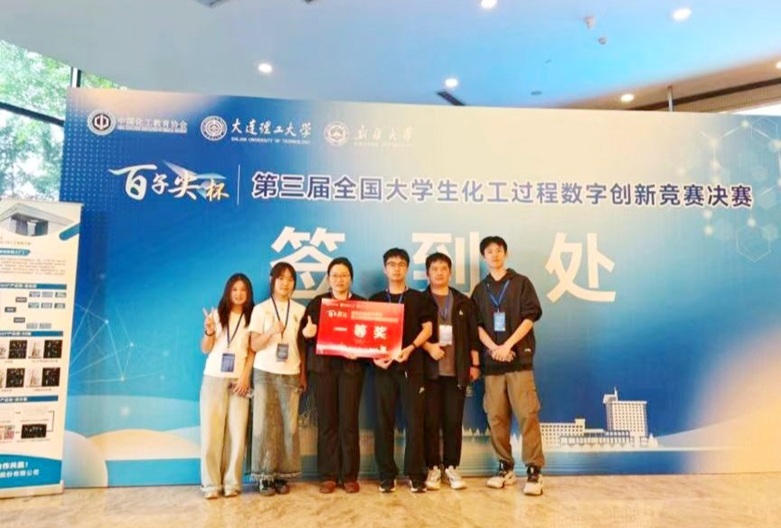From May 23-26, the Third National College Chemical Process Digital Innovation Competition National Finals took place at Dalian University of Technology. The “Ester to the Future” team from SCMU’s School of Chemistry and Materials Science, consisting of Yang Shengli, Wang Qian, Zuo Xuewenjing, Yang Changjin, and Luo Jinfei, won first prize in the national finals.

Award-winning team photo.
Photo courtesy of School of Chemistry and Materials Science
At the beginning of last winter break, team captain Yang Shengli carefully developed a Gantt chart, dividing the 2.5-month preparation period into five key phases: steady-state simulation, dynamic modeling, project optimization and innovation, with tasks mapped out to specific daily milestones and a structured system of daily check-ins and weekly progress reviews. This disciplined time management approach forged strong team execution capabilities. Reflecting on the competition journey, Yang Shengli remarked emotionally, “Those late nights witnessed our growth, and each precise simulation recorded our progress.” Zuo Xuewenjing added, “Teamwork is crucial, and pooling our strengths maximizes efficiency. Throughout countless days and nights of preparation, we supported each other, learned together, and tackled challenges collectively, achieving growth in both individual capabilities and team spirit.”
Team members deeply understood that the bridge between theory and practice requires constant experimentation and innovation. Yang Changjin, responsible for graphic configuration work, learned various theoretical knowledge and professional software from scratch while working with the team to overcome challenges. He said, “During the competition, the teachers’ questions were more closely aligned with actual production design thinking, opening new perspectives for us while exposing our shortcomings in practical applications. It was tremendously beneficial.”
The advisory team consisting of Hong Jingping, Yan Junkun, and Jin Shiwei provided guidance to students on technical challenges while focusing on developing their engineering mindset and problem-solving abilities. They offered comprehensive guidance from simulation process design to control scheme optimization, from theoretical knowledge organization to practical operation standards. Professor Hong Jingping noted, “The competition process provides comprehensive training for students. Students made significant progress in everything from professional knowledge application to teamwork to problem-solving capabilities.”
School of Chemistry and Materials Science leadership stated that this award vividly demonstrates the school’s educational approach of “promoting learning, teaching, and innovation through competition”. Discipline construction and talent development complement each other in competitions. By participating in high-level competitions, the school stays current with cutting-edge disciplinary needs and development trends, optimizes curriculum design and teaching methods, and feeds competition practical experience back into teaching, making discipline construction more practical and talent development more aligned with contemporary needs.
This competition was hosted by the China Chemical Education Association and organized by Dalian University of Technology, representing the premier event in the chemical engineering field.